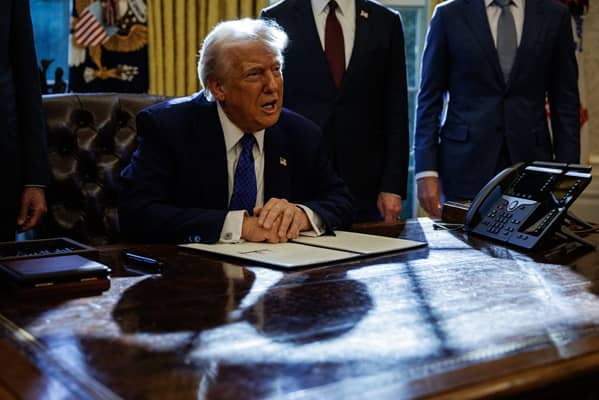President Donald Trump has announced the imposition of new tariffs of 25% on products from Mexico and Canada, as well as an additional 10% on Chinese imports.
These measures have been justified because these countries have failed to curb the trafficking of fentanyl into the United States.
With these sanctions, the cumulative tariff on China rises to 20%, in a context where his administration insists that the synthetic opioid crisis remains alarming.
The decision to increase tariffs has generated economic uncertainty, especially in Mexico, where investments worth 60 billion pesos have been suspended.
In particular, the automotive industry will be seriously affected, as most vehicles assembled in the country are destined for the U.S. market.
Adding to this is the threat of imposing a 10% tax on migrant remittances, which could negatively impact millions of families who depend on these funds.
In terms of security, the Trump administration has reinforced its anti-narcotics strategy by designating six Mexican cartels as terrorist organizations. This designation grants greater authority to agencies such as the CIA and the DEA to intervene more aggressively in Mexico, including intelligence operations and financial controls. However, these actions could lead to collateral effects, such as an increase in drug consumption within the U.S. and the need to strengthen security and public health policies.
The new trade sanctions are part of a broader strategy against China on the international stage. In addition to tariffs, the United States has imposed restrictions on Chinese companies and tightened its policy regarding Taiwan. In response, China has implemented retaliatory tariffs of 10% on U.S. products, although it is expected to escalate its countermeasures in the future.
Mexico and Canada have begun negotiations with the Trump administration to prevent the imposition of these tariffs. Both countries have emphasized the efforts made to combat fentanyl trafficking and strengthen border security. However, the stance of the U.S. government remains inflexible, which could have severe economic consequences for the region.
These policies will also affect the manufacturing and agricultural industries, as they heavily rely on trade with the United States. Companies across different sectors may face higher costs, which will eventually be passed on to end consumers. Moreover, the possibility of trade retaliation from the affected countries could create an atmosphere of global economic instability.
Despite negotiation efforts, uncertainty continues to dominate the economic landscape of North America. The measures adopted by Trump could have long-term repercussions, not only on international trade but also on diplomatic relations among the involved countries. The Mexican economy, in particular, will need to adapt to this new scenario and seek alternatives to mitigate the adverse effects of these policies.
In conclusion, Donald Trump’s imposition of new tariffs has significantly impacted North America’s economy and security. While the affected countries seek solutions through dialogue, international trade faces a period of uncertainty that could redefine economic relations on a global scale.

